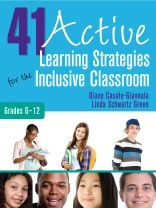’Bueller?’ Keys to engaging secondary students
Motivating adolescents to learn can be a challenge! Often distracted and easily bored, these kids are also critical thinkers capable of thriving in the classroom while learning 21st century skills. How do we hold their attention and develop their abilities?
Research shows that all students—regardless of learning style, disability category, or language difference—learn more effectively when they are engaged in active learning. 41 Active Learning Strategies for the Inclusive Classroom shows teachers how to help all students achieve positive learning outcomes. The authors provide a compilation of strategies that serve as blueprints for instructional design and directions for using them across a variety of content areas. The many benefits of active learning include:
- A more engaged and interactive classroom
- Increased self-directed learning
- Development of higher-order thinking skills such as analysis, synthesis, evaluation
- Improved reading, discussion, and writing competencies
Each strategy includes materials, directions, sample applications across content areas, ways to support students with learning differences, and sample vignettes. New teacher requirements and raised expectations to meet higher standards for all students might make the teaching challenge look daunting. The authors understand your journey, and will walk you through the process step-by-step so that you are fully prepared to achieve success!
Spis treści
Preface
Acknowledgments
About the Authors
1. Inclusion at the Secondary Level
2. Active Learning Strategies in the Middle School and High School: Debunking the Myth
3. Selecting and Implementing Active Learning Strategies for the Inclusive Classroom
4. Grouping for Instruction: Who Goes Where With Whom to Do What
5. Active Learning Strategies
References
O autorze
Learn more about Linda Green′s PD offerings Consulting Description: Active Learning for the Inclusive Classroom, K-5Consulting Description: Active Learning for the Inclusive Classroom, 6-12Dr. Linda Green has a B.A. in English from University of Bridgeport, an M.A. in Special Education and Reading from Eastern New Mexico University, and a Ph.D. in Psychological & Cultural Studies and Special Education from University of Nebraska at Lincoln. She holds certifications in Special Education and Teacher of English and is currently as Associate Professor of Education at Centenary College.She has worked as a special education teacher and a consultant, preparing and implementing workshops on a variety of topics related to special education.Dr. Green is a member of the Council for Exceptional Children (CEC) and the Teacher Education Division of CEC. She presents regularly at national special education conferences, is a reviewer of conference proposals for national special education conferences, and a reviewer of manuscripts for special education texts for major education publishers.Dr. Green has taught most of the special education courses at Centenary on both the undergraduate and graduate level, and she developed and is the current director of the M.A. program in Special Education. She also serves as the director of the Teachers of Students with Disabilities Certification Program. She received the Centenary College Distinguished Teacher Award in 2000.She is the founding advisor of the Centenary College Student Chapter of the Council for Exceptional Children.












